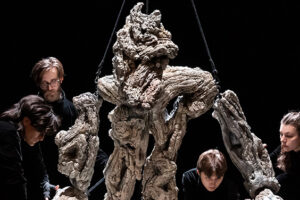

In 1959, Richard Condon, a former Hollywood publicist and agent, published his second novel, forging the decade’s anti-Communist paranoid frenzy into The Manchurian Candidate. In addition to the vast record of blacklisting and HUAC hearings, accounts of American troops brainwashed in Korea were the perfect fodder for the story of an American soldier brainwashed by Chinese Communists to kill on command: “the perfect assassin.” Condon also plagiarized Robert Graves’ I, Claudius in his narrative about a steely Soviet operative who attempts to take over the country using her brainwashed son.
The novel’s overwrought pulpiness (“an overripe banana,” Louis Menand calls it in his brilliant introduction to the 2004 edition) and recherché language were scrapped in John Frankenheimer’s 1962 film adaptation, as were the depictions of incest and heroin addiction, but it’s a classic cliffhanger, with Angela Lansbury turning in an unforgettable performance as Eleanor Iselin, the mother of all evil, Lawrence Harvey as her brainwashed son Sgt. Raymond Shaw and Frank Sinatra as Ben Marco, Shaw’s platoon commander, another brainwashing victim who figures out what’s going on. (The film was pulled after the Kennedy assassination but was re-released in the late 70s, which is when I fell in love with Lawrence Harvey.) For the uninitiated: Raymond goes into robot mode when he’s told to play a game of solitaire and deals out the queen of diamonds.
I had the opportunity to look at the score to this new opera beforehand and I was impressed by Campbell’s brilliant adaptation with its cinematic transitions between scenes and dramatic tension, at least verbally, and Puts’ use of ostinati to signal suspense, compulsion, paranoia, looked promising on paper but went unfulfilled on stage. Puts’ music has often been termed cinematic but he couldn’t maintain consistent melodic intensity for Campbell’s lines which read like a thriller.

It makes sense that Raymond and his brainwashed buddies sing monotonic phrases but I wanted those ostinati to have more tension and greater urgency. Puts was most effective in two quartets, one in the style of a Sicilienne which gave his innate lyricism a chance to fully bloom. But most of the time, Puts seems restrained, even in the love music for Raymond and Jocelyn Jordan, which should soar as Raymond breaks free of his mother’s grip, at least momentarily.
Puts does succeed with creating music that has the sound of Sousa marches, cheesy country, Dixieland, and jingles. That’s appropriate but, unfortunately, it only emphasized the lack of originality in the rest of the score. The final scene at the Republican convention should be a nail-biting climax but it just wasn’t. When the final shots ring out, I didn’t jump. I knew what was coming but like anyone who loves Hitchcock films, I wanted that thrill of suspense.
Let me say that I’m an admirer of Puts’ compositions. He’s an original. I just wish he’d put more of that originality into this opera, especially since he’s such a sensitive vocal writer and has an affinity for cinematic scores. I don’t want The Manchurian Candidate to be Silent Night but I hoped this score would be compelling as Silent Night is.

Matthew Worth made up for any lack of passion in the score with a riveting performance of Raymond Shaw. Leonardo Capalbo’s dramatic tenor was ideal for Ben Marco, haunted by the past and determined to deprogram Raymond. If Brenda Harris didn’t exude Eleanor Iselin’s powerful sexuality, she dominated the role with the chilling certitude of the fanatic.
It’s heartening to know that Minnesota Opera is committed to new works for future seasons. Next year’s premier is The Shining by Paul Moravec and librettist Mark Campbell, based on the Stephen King novel.
The Manchurian Candidate’s premier is part of a month-long celebration of the spectacular new concert hall at the Ordway Center for Performing Arts in St. Paul. We heard the St. Paul Chamber Orchestra on Friday evening and it was a revelation, acoustically and musically.
As I was reviewing my notes, I was obsessed with that lack of intensity. And suddenly I thought of Bernard Herrmann. Imagine what he could have done with a game of solitaire!
Photos: Michal Daniel for Minnesota Opera.
























Comments